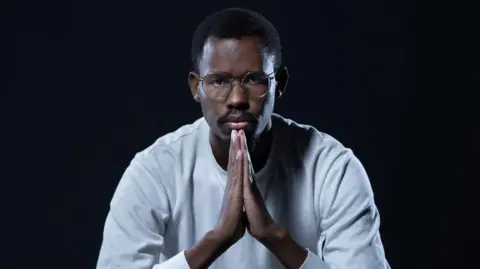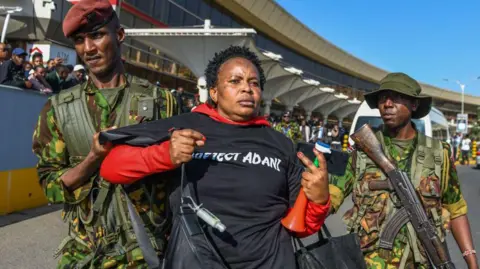 AFP
AFPKenyan business student Nelson Amenya has been hailed as a hero by those campaigning for greater transparency in the deals his government makes with private firms.
Kenya's recent history is full of stories of huge contracts being the result of corruption – and despite laws meant to prevent this from happening, there are suspicions that it continues to happen.
Mr Amenya, 30, who is studying in France for a master's degree in business administration, detailed on social media what he said was a proposed agreement between Kenya and the Adani Group, an Indian multinational, in July.
It concerned the management of the Jomo Kenyatta International Airport (JKIA) – the largest airport in the country and the region, which is long overdue for a comprehensive redevelopment.
“The first feeling I had (when I was handed the documents) was that this was just another government deal… I didn't understand the scale or the seriousness of it,” Mr Amenya, whose profile as an anti-corruption campaigner was on the rise, told the BBC.
The documents describe an offer worth 2 billion. (£1.6 billion) from the Adani Group to lease JKIA for 30 years to modernize and operate it.
As he began to review the documents, he felt that if this were to go ahead, it would “hurt the Kenyan economy” while all the benefit would go to the Indian multinational company.
From what he read, the deal seemed unfair to him, as Kenya would still put up the lion's share of the money but not reap the financial rewards.
Mr. Amenya had good reason to believe the documents were genuine because “the people who were giving me these documents were from very legitimate government departments,” he says.
Adani Group is involved in infrastructure, mining and energy projects globally, in countries such as Israel, UAE, France, Tanzania, Australia and Greece. Its founder Gautam Adani is a major player in India's economy and a close ally of India's Prime Minister Narendra Modi.
Through further reading, Mr Amenya says he discovered that Adani's deal with Kenya could leave his country liable to pay the company if it does not recoup its investment.
“It was a big breach of trust of the people from the leadership of the president, the Kenya Airports Authority, the minister – they all betrayed the people,” he claimed.
Despite the evidence in his hands, Mr Amenya struggled with what to do next. His own safety was at risk, although he was better off in France than in Kenya, where anti-corruption activists were targeted and some killed.
“I was a little scared. I didn't know what was going to happen. I'm risking my career, I'm risking my life, why should I take the risk to do this?” he asked himself then.
Ultimately, however, he felt that silence was not an option.
“You know, only cowards live long.”
After spending weeks reviewing what was sent to him, Mr Amenya leaked the documents to his X page in July, sparking immediate outrage in Kenya.
JKIA airport workers went on strike demanding that the deal be scrapped.
 Getty Images
Getty Images“It felt like a duty to me, to my country. Even if I am far away, I still have a debt to my country. I want to see a better Kenya, my home country become developed, industrialized and an end to corruption. “
He worried that the airport deal was a harbinger of things to come.
Mr Amenya says not only are the unusual conditions and lack of transparency alarming, but also, he says, Kenyan laws appear to be systematically ignored.
“(The authorities) never did due diligence on this company … they didn't follow the proper procurement process.”
He alleged that some public officials hoped to circumvent legal requirements, including public consultation, which are supposed to prevent the misuse of taxpayers' money.
An April report by the Kenya Airports Authority on the proposed deal highlighted that there was no plan to consult stakeholders on the plan.
“That was in April and until July when I disclosed this they had not made any public involvement. It was quite a secret deal and at that time they were only a month away from signing the deal,” claimed Mr Amenya.
“After I disclosed this deal, they hurriedly tried to come and do like a bogus public participation – they called Kenya Airports Authority staff and started holding meetings with interested parties.”
Various officials and branches of the state denied allegations of corruption in the process, and the authorities went on to sign another multimillion-dollar deal with the Adani Group – this time to build power lines.
Adani Group said Mr Amenya's allegations were baseless and malicious.
A spokesperson told the BBC that “the proposal was submitted in accordance with Kenya's public-private partnership rules and aims to create a world-class airport and significantly improve Kenya's economy by creating a host of new jobs.”
Adani Group also says no contract has been signed as “discussions have not reached a binding agreement”.
The company also says the energy deal proposal was above board and that the company “categorically rejects all allegations and insinuations of any violation of Kenyan laws in our operations or proposals.
“Every project we undertake is guided by a strong commitment to compliance, transparency and the laws of the respective countries in which we operate,” the statement said.
But it wasn't Mr Amenya's leaks that changed the government's mind.
It was only when US authorities charged Gautam Adani with alleged involvement in a $250m (£200m) bribery scheme that Kenya took action.
Adani Group representatives rejected the accusations of US prosecutors and called them “baseless”.
In a State of the Nation address in parliament last month, Kenyan President William Ruto announced the cancellation of the two Adani deals.
“In the face of irrefutable evidence or credible information about corruption, I will not hesitate to take decisive action,” Ruto said in a speech that was met with thunderous cheers in parliament.
Kenyans celebrated the decision, which Ruto attributed to new information provided by investigative agencies and partner nations.
“I was in class when this message came. I couldn't believe it,” says Mr Amenya.
“I think I had tears in my eyes for the first hour. I was so happy.”
Although he does not see himself as a hero, messages of support have poured in from all over, including India.
Forty minutes into the hour he posted his now famous tweet “Adios Adani!!” – goodbye Adani.
“It was important… Everything I did finally paid off.”
The sense of triumph, however, came after months of personal struggle and tension.
Soon after revealing the airport deal, Mr Amenya was sued for defamation by an Adani Group representative and a Kenyan politician, prompting him to question whether he should continue.
“I had some people coming to me from the government, even willing to pay me, saying, 'You need to withdraw money and just stop this fight with the government,'” he recalled.
“It would be the biggest mistake of my life to quit, a betrayal of the Kenyan people.
But even after canceling the deals, President Ruto still questions why Kenyans opposed this and many other projects he supported. He says he will find a way to renovate the airport.
“I saw them saying that those who stopped the modernization of our airport were heroes. Heroes? What do you gain when you stop building an airport in your country?” Ruto asked at a public ceremony in early December.
“You have no idea how it's going to be built, and those who oppose it have never even set foot in an airport, you just want to oppose it.”
Mr Amenya, who still faces defamation cases, is now fundraising to help with his legal fees and says his future in Kenya is uncertain.
“I have received threats from credible intelligence agencies and people in Kenya warning me not to come back because there are obviously some people who are very angry about what I have done,” he says.
A steep price, but one Mr. Amenya says he'd gladly pay again.
“We really don't have to wait for someone to save us,” he says.
You may also be interested in:
 Getty Images/BBC
Getty Images/BBC
